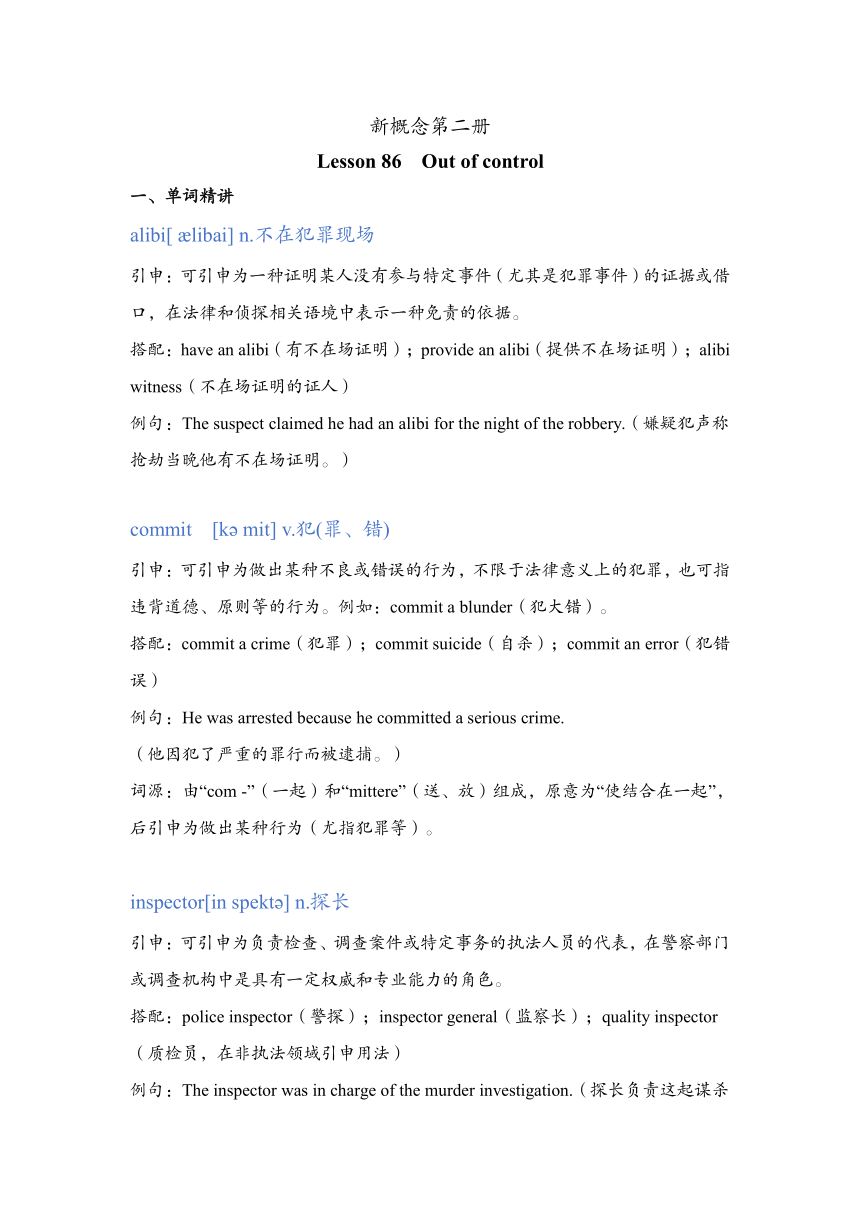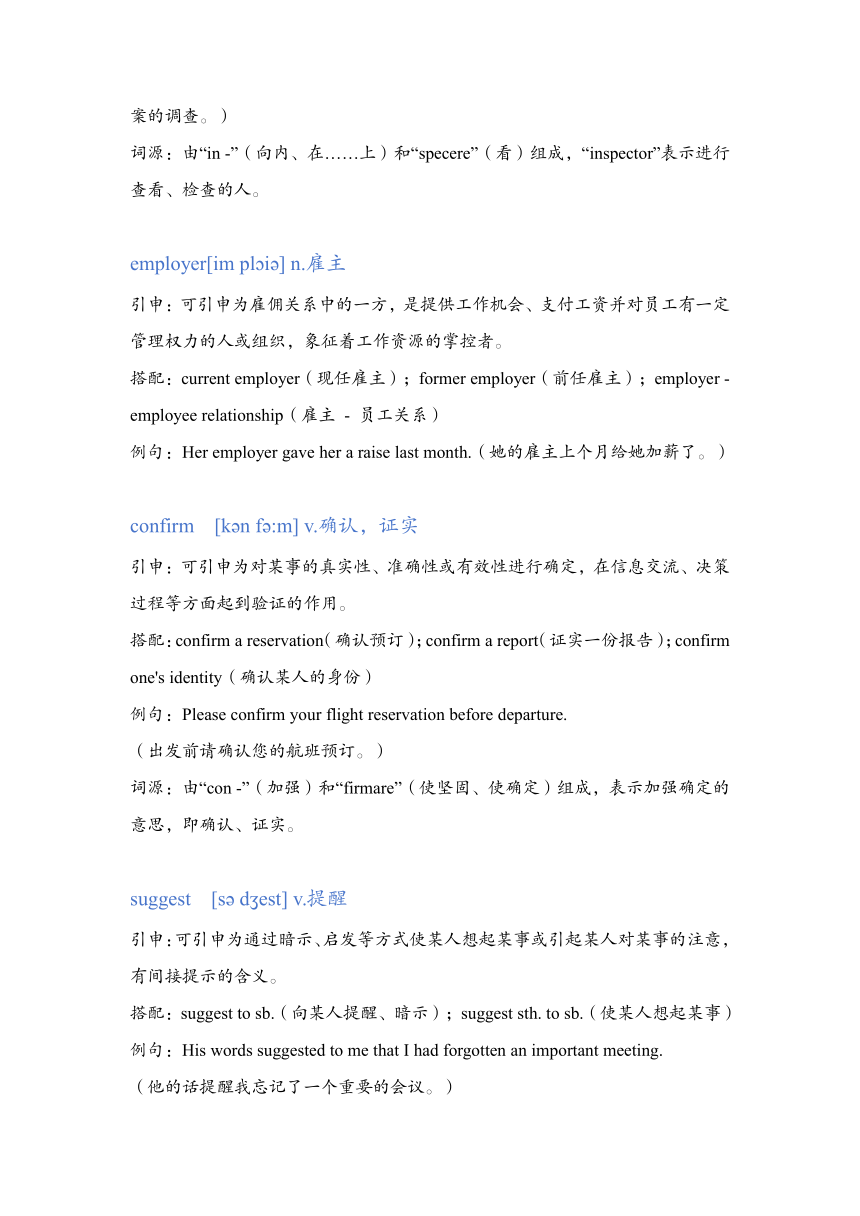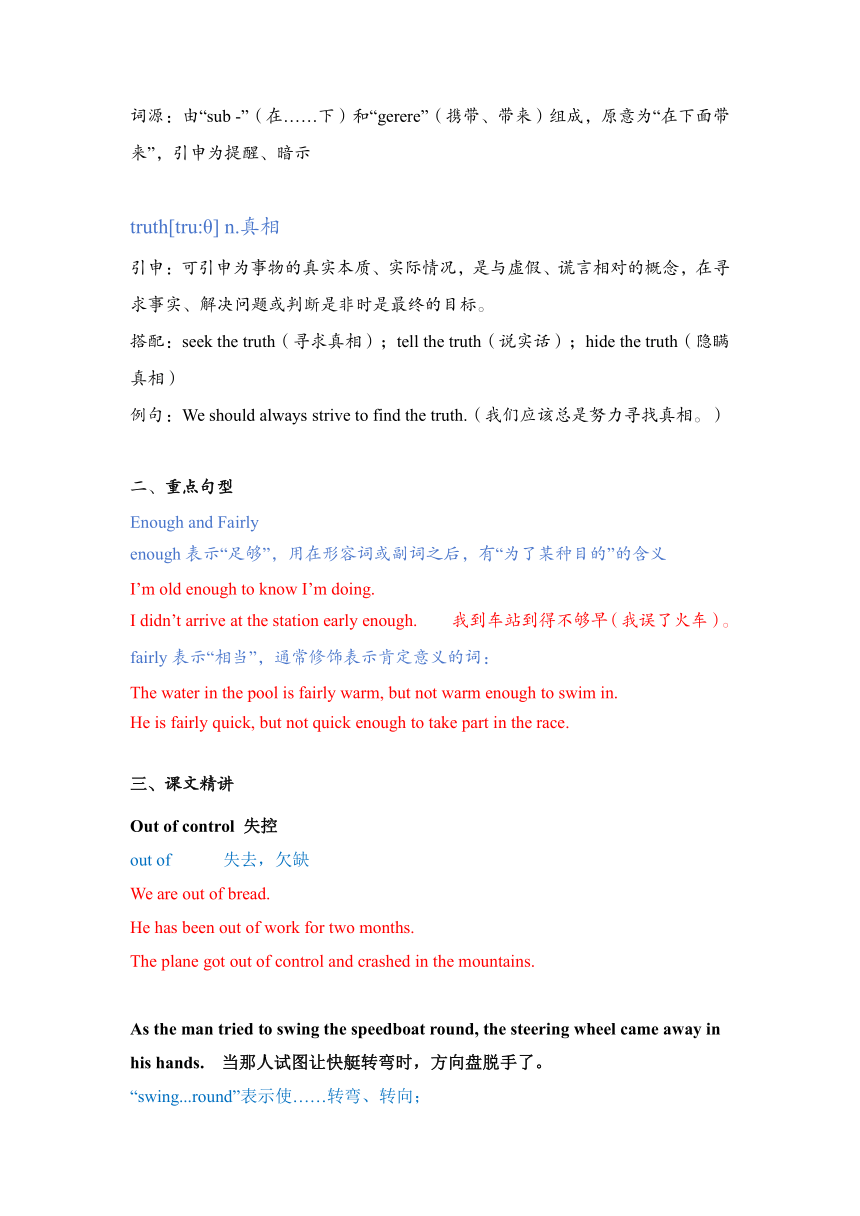新概念第二册Lesson 86 Out of control讲义
文档属性
| 名称 | 新概念第二册Lesson 86 Out of control讲义 |  | |
| 格式 | docx | ||
| 文件大小 | 112.9KB | ||
| 资源类型 | 教案 | ||
| 版本资源 | 新概念英语 | ||
| 科目 | 英语 | ||
| 更新时间 | 2024-11-25 19:35:27 | ||
图片预览



文档简介
新概念第二册
Lesson 86 Out of control
单词精讲
alibi[ libai] n.不在犯罪现场
引申:可引申为一种证明某人没有参与特定事件(尤其是犯罪事件)的证据或借口,在法律和侦探相关语境中表示一种免责的依据。
搭配:have an alibi(有不在场证明);provide an alibi(提供不在场证明);alibi witness(不在场证明的证人)
例句:The suspect claimed he had an alibi for the night of the robbery.(嫌疑犯声称抢劫当晚他有不在场证明。)
commit [k mit] v.犯(罪、错)
引申:可引申为做出某种不良或错误的行为,不限于法律意义上的犯罪,也可指违背道德、原则等的行为。例如:commit a blunder(犯大错)。
搭配:commit a crime(犯罪);commit suicide(自杀);commit an error(犯错误)
例句:He was arrested because he committed a serious crime.
(他因犯了严重的罪行而被逮捕。)
词源:由“com -”(一起)和“mittere”(送、放)组成,原意为“使结合在一起”,后引申为做出某种行为(尤指犯罪等)。
inspector[in spekt ] n.探长
引申:可引申为负责检查、调查案件或特定事务的执法人员的代表,在警察部门或调查机构中是具有一定权威和专业能力的角色。
搭配:police inspector(警探);inspector general(监察长);quality inspector(质检员,在非执法领域引申用法)
例句:The inspector was in charge of the murder investigation.(探长负责这起谋杀案的调查。)
词源:由“in -”(向内、在……上)和“specere”(看)组成,“inspector”表示进行查看、检查的人。
employer[im pl i ] n.雇主
引申:可引申为雇佣关系中的一方,是提供工作机会、支付工资并对员工有一定管理权力的人或组织,象征着工作资源的掌控者。
搭配:current employer(现任雇主);former employer(前任雇主);employer - employee relationship(雇主 - 员工关系)
例句:Her employer gave her a raise last month.(她的雇主上个月给她加薪了。)
confirm [k n f :m] v.确认,证实
引申:可引申为对某事的真实性、准确性或有效性进行确定,在信息交流、决策过程等方面起到验证的作用。
搭配:confirm a reservation(确认预订);confirm a report(证实一份报告);confirm one's identity(确认某人的身份)
例句:Please confirm your flight reservation before departure.
(出发前请确认您的航班预订。)
词源:由“con -”(加强)和“firmare”(使坚固、使确定)组成,表示加强确定的意思,即确认、证实。
suggest [s d est] v.提醒
引申:可引申为通过暗示、启发等方式使某人想起某事或引起某人对某事的注意,有间接提示的含义。
搭配:suggest to sb.(向某人提醒、暗示);suggest sth. to sb.(使某人想起某事)
例句:His words suggested to me that I had forgotten an important meeting.
(他的话提醒我忘记了一个重要的会议。)
词源:由“sub -”(在……下)和“gerere”(携带、带来)组成,原意为“在下面带来”,引申为提醒、暗示
truth[tru:θ] n.真相
引申:可引申为事物的真实本质、实际情况,是与虚假、谎言相对的概念,在寻求事实、解决问题或判断是非时是最终的目标。
搭配:seek the truth(寻求真相);tell the truth(说实话);hide the truth(隐瞒真相)
例句:We should always strive to find the truth.(我们应该总是努力寻找真相。)
重点句型
Enough and Fairly
enough表示“足够”,用在形容词或副词之后,有“为了某种目的”的含义
I’m old enough to know I’m doing.
I didn’t arrive at the station early enough. 我到车站到得不够早(我误了火车)。
fairly表示“相当”,通常修饰表示肯定意义的词:
The water in the pool is fairly warm, but not warm enough to swim in.
He is fairly quick, but not quick enough to take part in the race.
课文精讲
Out of control 失控
out of 失去,欠缺
We are out of bread.
He has been out of work for two months.
The plane got out of control and crashed in the mountains.
As the man tried to swing the speedboat round, the steering wheel came away in his hands. 当那人试图让快艇转弯时,方向盘脱手了。
“swing...round”表示使……转弯、转向;
“steering wheel”是“方向盘”的意思
come away 脱落,离开,脱离,脱开
When I tried to lift the suitcase, the handle came away.
He waved desperately to his companion, who had been water skiing for the last fifteen minutes.
他绝望地向他的伙伴挥手,他的伙伴在过去的15分钟里一直在滑水。
这是一个主从复合句。“He waved desperately to his companion”是主句,“He”是主语,“waved”是谓语,“desperately”是副词作状语,表示方式,“to his companion”是介词短语作状语,表示对象。“who had been water skiing for the last fifteen minutes”是定语从句,修饰“companion”,其中“who”是关系代词,在从句中作主语,“had been water skiing”是过去完成进行时,表示在过去某个时间之前一直在进行的动作,“for the last fifteen minutes”是时间状语。
“wave to sb.”表示向某人挥手。“water skiing”是滑水运动
Both men had hardly had time to realize what was happening when they were thrown violently into the sea.
他们两个还没来得及意识到究竟发生了什么事情,就被猛地抛入了海里。
这是一个主从复合句。“Both men had hardly had time to realize what was happening”是主句,其中“Both men”是主语,“had hardly had time”是过去完成时,表示在过去某个动作之前已经发生的动作,“hardly”表示几乎不,加强语气,“to realize what was happening”是不定式短语作后置定语,其中“what was happening”是宾语从句,作“realize”的宾语。“when they were thrown violently into the sea”是时间状语从句,“they”是主语,“were thrown”是一般过去时的被动语态,表示被扔、被抛,“violently”是副词作状语,“into the sea”是介词短语作状语。
“hardly...when...”是固定结构,表示“一……就……;几乎未来得及……就……”。“realize”表示意识到。
The speedboat had struck a buoy, but it continued to move very quickly across the water.
快艇撞上了一个浮标,但它仍在水面上快速行驶着。
这是一个并列句,由“but”连接两个分句。“The speedboat had struck a buoy”是第一个分句,其中“The speedboat”是主语,“had struck”是过去完成时,表示过去某个时间之前发生的动作,“a buoy”是宾语。“it continued to move very quickly across the water”是第二个分句,“it”是主语,“continued to move”是谓语,表示继续移动,“very quickly”是副词短语作状语,“across the water”是介词短语作状语。
“strike”在这里表示撞击。“continue to do sth.”表示继续做某事。
Both men had just begun to swim towards the shore, when they noticed with dismay that the speedboat was moving in a circle.
两个人刚开始向岸边游去,就突然惊愕地发现快艇正在转着圈行驶,它现在正以惊人的速度直冲他们驶来。
这是一个主从复合句。“Both men had just begun to swim towards the shore”是主句,“Both men”是主语,“had just begun to swim”是过去完成时,表示过去某个时间之前已经开始的动作,“towards the shore”是介词短语作状语。“when they noticed with dismay that the speedboat was moving in a circle”是时间状语从句,其中“they”是主语,“noticed”是谓语,“with dismay”是介词短语作状语,表示情绪状态,“that the speedboat was moving in a circle”是宾语从句,作“noticed”的宾语,“the speedboat”是从句的主语,“was moving”是过去进行时,表示过去某个时刻正在进行的动作,“in a circle”是介词短语作状语。
“begin to do sth.”表示开始做某事。“notice”表示注意到。“with dismay”表示沮丧地。
It now came straight towards them at tremendous speed.
不到1分钟的工夫,它从离他们只有几英尺远的地方呼啸着驶了过去。
这是一个简单句。“It”是主语,指快艇,“now”是时间副词,“came”是谓语,表示过来,“straight towards them”是介词短语作状语,表示方向,“at tremendous speed”是介词短语作状语,表示速度。
“straight”表示直接地。“tremendous”表示巨大的、极快的。
In less than a minute, it roared past them only a few feet away.
不到1分钟的工夫,它从离他们只有几英尺远的地方呼啸着驶了过去。
这是一个简单句。“In less than a minute”是时间状语,“it”是主语,“roared past”是谓语,表示呼啸而过,“them”是宾语,“only a few feet away”是后置定语,修饰“them”。
“roar past”表示呼啸而过,发出轰鸣声地经过。
After it had passed, they swam on as quickly as they could because they knew that the boat would soon return.
快艇过去之后,他们以最快的速度向前游去,因为他们知道快艇马上就要转回来。
这是一个主从复合句。“After it had passed”是时间状语从句,“it”是主语,“had passed”是过去完成时,表示过去某个动作之前已经发生的动作。“they swam on as quickly as they could”是主句,“they”是主语,“swam on”表示继续游,“as quickly as they could”是比较状语从句的省略形式,表示尽可能快地。“because they knew that the boat would soon return”是原因状语从句,“they”是主语,“knew”是谓语,“that the boat would soon return”是宾语从句,“the boat”是从句的主语,“would soon return”是过去将来时,表示在过去看来将要发生的动作。
“swim on”表示继续游。“as...as one can”表示尽可能……。
They had just had enough time to swim out of danger when the boat again completed a circle.
他们刚刚来得及游出危险区,快艇就又转完了一圈。
这是一个主从复合句。“They had just had enough time to swim out of danger”是主句,“They”是主语,“had just had”是过去完成时,表示过去某个动作之前已经发生的动作,“enough time”是宾语,“to swim out of danger”是不定式短语作后置定语。“when the boat again completed a circle”是时间状语从句,“the boat”是主语,“again”是副词,“completed”是谓语,“a circle”是宾语。
“swim out of danger”表示游出危险区域
On this occasion, however, it had slowed down considerably.
然而这一次它的速度慢多了。
on this occasion 这一次
“slow down”表示减速。“considerably”表示相当大地、在很大程度上。
The petrol had nearly all been used up.汽油几乎已经用光。
use up 耗尽,用光,用完
They have just bought a house and a car. They must have used up all their money.
up表示“彻底地,完全地”,也可与其他一些动词连用:
The child soon ate up the cake.
She burned up all his letters.
Can you read up the book in two hours
Before long, the noise dropped completely and the boat began to drift gently across the water.
没过多久,噪音便彻底消失,快艇开始在水面上慢悠悠地漂流。
drop vi. 减少,变弱,消失
When he saw that Mary was annoyed, his voice dropped.
We had to stay at home before the wind had dropped.
由“and”连接两个分句。“Before long”是时间状语,表示不久之后。“the noise dropped completely”是第一个分句,“the noise”是主语,“dropped”是谓语,表示降低、消失,“completely”是副词作状语,表示程度。“the boat began to drift gently across the water”是第二个分句,“the boat”是主语,“began to drift”是谓语,表示开始漂流,“gently”是副词作状语,表示方式,“across the water”是介词短语作状语,表示地点。
Lesson 86 Out of control
单词精讲
alibi[ libai] n.不在犯罪现场
引申:可引申为一种证明某人没有参与特定事件(尤其是犯罪事件)的证据或借口,在法律和侦探相关语境中表示一种免责的依据。
搭配:have an alibi(有不在场证明);provide an alibi(提供不在场证明);alibi witness(不在场证明的证人)
例句:The suspect claimed he had an alibi for the night of the robbery.(嫌疑犯声称抢劫当晚他有不在场证明。)
commit [k mit] v.犯(罪、错)
引申:可引申为做出某种不良或错误的行为,不限于法律意义上的犯罪,也可指违背道德、原则等的行为。例如:commit a blunder(犯大错)。
搭配:commit a crime(犯罪);commit suicide(自杀);commit an error(犯错误)
例句:He was arrested because he committed a serious crime.
(他因犯了严重的罪行而被逮捕。)
词源:由“com -”(一起)和“mittere”(送、放)组成,原意为“使结合在一起”,后引申为做出某种行为(尤指犯罪等)。
inspector[in spekt ] n.探长
引申:可引申为负责检查、调查案件或特定事务的执法人员的代表,在警察部门或调查机构中是具有一定权威和专业能力的角色。
搭配:police inspector(警探);inspector general(监察长);quality inspector(质检员,在非执法领域引申用法)
例句:The inspector was in charge of the murder investigation.(探长负责这起谋杀案的调查。)
词源:由“in -”(向内、在……上)和“specere”(看)组成,“inspector”表示进行查看、检查的人。
employer[im pl i ] n.雇主
引申:可引申为雇佣关系中的一方,是提供工作机会、支付工资并对员工有一定管理权力的人或组织,象征着工作资源的掌控者。
搭配:current employer(现任雇主);former employer(前任雇主);employer - employee relationship(雇主 - 员工关系)
例句:Her employer gave her a raise last month.(她的雇主上个月给她加薪了。)
confirm [k n f :m] v.确认,证实
引申:可引申为对某事的真实性、准确性或有效性进行确定,在信息交流、决策过程等方面起到验证的作用。
搭配:confirm a reservation(确认预订);confirm a report(证实一份报告);confirm one's identity(确认某人的身份)
例句:Please confirm your flight reservation before departure.
(出发前请确认您的航班预订。)
词源:由“con -”(加强)和“firmare”(使坚固、使确定)组成,表示加强确定的意思,即确认、证实。
suggest [s d est] v.提醒
引申:可引申为通过暗示、启发等方式使某人想起某事或引起某人对某事的注意,有间接提示的含义。
搭配:suggest to sb.(向某人提醒、暗示);suggest sth. to sb.(使某人想起某事)
例句:His words suggested to me that I had forgotten an important meeting.
(他的话提醒我忘记了一个重要的会议。)
词源:由“sub -”(在……下)和“gerere”(携带、带来)组成,原意为“在下面带来”,引申为提醒、暗示
truth[tru:θ] n.真相
引申:可引申为事物的真实本质、实际情况,是与虚假、谎言相对的概念,在寻求事实、解决问题或判断是非时是最终的目标。
搭配:seek the truth(寻求真相);tell the truth(说实话);hide the truth(隐瞒真相)
例句:We should always strive to find the truth.(我们应该总是努力寻找真相。)
重点句型
Enough and Fairly
enough表示“足够”,用在形容词或副词之后,有“为了某种目的”的含义
I’m old enough to know I’m doing.
I didn’t arrive at the station early enough. 我到车站到得不够早(我误了火车)。
fairly表示“相当”,通常修饰表示肯定意义的词:
The water in the pool is fairly warm, but not warm enough to swim in.
He is fairly quick, but not quick enough to take part in the race.
课文精讲
Out of control 失控
out of 失去,欠缺
We are out of bread.
He has been out of work for two months.
The plane got out of control and crashed in the mountains.
As the man tried to swing the speedboat round, the steering wheel came away in his hands. 当那人试图让快艇转弯时,方向盘脱手了。
“swing...round”表示使……转弯、转向;
“steering wheel”是“方向盘”的意思
come away 脱落,离开,脱离,脱开
When I tried to lift the suitcase, the handle came away.
He waved desperately to his companion, who had been water skiing for the last fifteen minutes.
他绝望地向他的伙伴挥手,他的伙伴在过去的15分钟里一直在滑水。
这是一个主从复合句。“He waved desperately to his companion”是主句,“He”是主语,“waved”是谓语,“desperately”是副词作状语,表示方式,“to his companion”是介词短语作状语,表示对象。“who had been water skiing for the last fifteen minutes”是定语从句,修饰“companion”,其中“who”是关系代词,在从句中作主语,“had been water skiing”是过去完成进行时,表示在过去某个时间之前一直在进行的动作,“for the last fifteen minutes”是时间状语。
“wave to sb.”表示向某人挥手。“water skiing”是滑水运动
Both men had hardly had time to realize what was happening when they were thrown violently into the sea.
他们两个还没来得及意识到究竟发生了什么事情,就被猛地抛入了海里。
这是一个主从复合句。“Both men had hardly had time to realize what was happening”是主句,其中“Both men”是主语,“had hardly had time”是过去完成时,表示在过去某个动作之前已经发生的动作,“hardly”表示几乎不,加强语气,“to realize what was happening”是不定式短语作后置定语,其中“what was happening”是宾语从句,作“realize”的宾语。“when they were thrown violently into the sea”是时间状语从句,“they”是主语,“were thrown”是一般过去时的被动语态,表示被扔、被抛,“violently”是副词作状语,“into the sea”是介词短语作状语。
“hardly...when...”是固定结构,表示“一……就……;几乎未来得及……就……”。“realize”表示意识到。
The speedboat had struck a buoy, but it continued to move very quickly across the water.
快艇撞上了一个浮标,但它仍在水面上快速行驶着。
这是一个并列句,由“but”连接两个分句。“The speedboat had struck a buoy”是第一个分句,其中“The speedboat”是主语,“had struck”是过去完成时,表示过去某个时间之前发生的动作,“a buoy”是宾语。“it continued to move very quickly across the water”是第二个分句,“it”是主语,“continued to move”是谓语,表示继续移动,“very quickly”是副词短语作状语,“across the water”是介词短语作状语。
“strike”在这里表示撞击。“continue to do sth.”表示继续做某事。
Both men had just begun to swim towards the shore, when they noticed with dismay that the speedboat was moving in a circle.
两个人刚开始向岸边游去,就突然惊愕地发现快艇正在转着圈行驶,它现在正以惊人的速度直冲他们驶来。
这是一个主从复合句。“Both men had just begun to swim towards the shore”是主句,“Both men”是主语,“had just begun to swim”是过去完成时,表示过去某个时间之前已经开始的动作,“towards the shore”是介词短语作状语。“when they noticed with dismay that the speedboat was moving in a circle”是时间状语从句,其中“they”是主语,“noticed”是谓语,“with dismay”是介词短语作状语,表示情绪状态,“that the speedboat was moving in a circle”是宾语从句,作“noticed”的宾语,“the speedboat”是从句的主语,“was moving”是过去进行时,表示过去某个时刻正在进行的动作,“in a circle”是介词短语作状语。
“begin to do sth.”表示开始做某事。“notice”表示注意到。“with dismay”表示沮丧地。
It now came straight towards them at tremendous speed.
不到1分钟的工夫,它从离他们只有几英尺远的地方呼啸着驶了过去。
这是一个简单句。“It”是主语,指快艇,“now”是时间副词,“came”是谓语,表示过来,“straight towards them”是介词短语作状语,表示方向,“at tremendous speed”是介词短语作状语,表示速度。
“straight”表示直接地。“tremendous”表示巨大的、极快的。
In less than a minute, it roared past them only a few feet away.
不到1分钟的工夫,它从离他们只有几英尺远的地方呼啸着驶了过去。
这是一个简单句。“In less than a minute”是时间状语,“it”是主语,“roared past”是谓语,表示呼啸而过,“them”是宾语,“only a few feet away”是后置定语,修饰“them”。
“roar past”表示呼啸而过,发出轰鸣声地经过。
After it had passed, they swam on as quickly as they could because they knew that the boat would soon return.
快艇过去之后,他们以最快的速度向前游去,因为他们知道快艇马上就要转回来。
这是一个主从复合句。“After it had passed”是时间状语从句,“it”是主语,“had passed”是过去完成时,表示过去某个动作之前已经发生的动作。“they swam on as quickly as they could”是主句,“they”是主语,“swam on”表示继续游,“as quickly as they could”是比较状语从句的省略形式,表示尽可能快地。“because they knew that the boat would soon return”是原因状语从句,“they”是主语,“knew”是谓语,“that the boat would soon return”是宾语从句,“the boat”是从句的主语,“would soon return”是过去将来时,表示在过去看来将要发生的动作。
“swim on”表示继续游。“as...as one can”表示尽可能……。
They had just had enough time to swim out of danger when the boat again completed a circle.
他们刚刚来得及游出危险区,快艇就又转完了一圈。
这是一个主从复合句。“They had just had enough time to swim out of danger”是主句,“They”是主语,“had just had”是过去完成时,表示过去某个动作之前已经发生的动作,“enough time”是宾语,“to swim out of danger”是不定式短语作后置定语。“when the boat again completed a circle”是时间状语从句,“the boat”是主语,“again”是副词,“completed”是谓语,“a circle”是宾语。
“swim out of danger”表示游出危险区域
On this occasion, however, it had slowed down considerably.
然而这一次它的速度慢多了。
on this occasion 这一次
“slow down”表示减速。“considerably”表示相当大地、在很大程度上。
The petrol had nearly all been used up.汽油几乎已经用光。
use up 耗尽,用光,用完
They have just bought a house and a car. They must have used up all their money.
up表示“彻底地,完全地”,也可与其他一些动词连用:
The child soon ate up the cake.
She burned up all his letters.
Can you read up the book in two hours
Before long, the noise dropped completely and the boat began to drift gently across the water.
没过多久,噪音便彻底消失,快艇开始在水面上慢悠悠地漂流。
drop vi. 减少,变弱,消失
When he saw that Mary was annoyed, his voice dropped.
We had to stay at home before the wind had dropped.
由“and”连接两个分句。“Before long”是时间状语,表示不久之后。“the noise dropped completely”是第一个分句,“the noise”是主语,“dropped”是谓语,表示降低、消失,“completely”是副词作状语,表示程度。“the boat began to drift gently across the water”是第二个分句,“the boat”是主语,“began to drift”是谓语,表示开始漂流,“gently”是副词作状语,表示方式,“across the water”是介词短语作状语,表示地点。
同课章节目录
